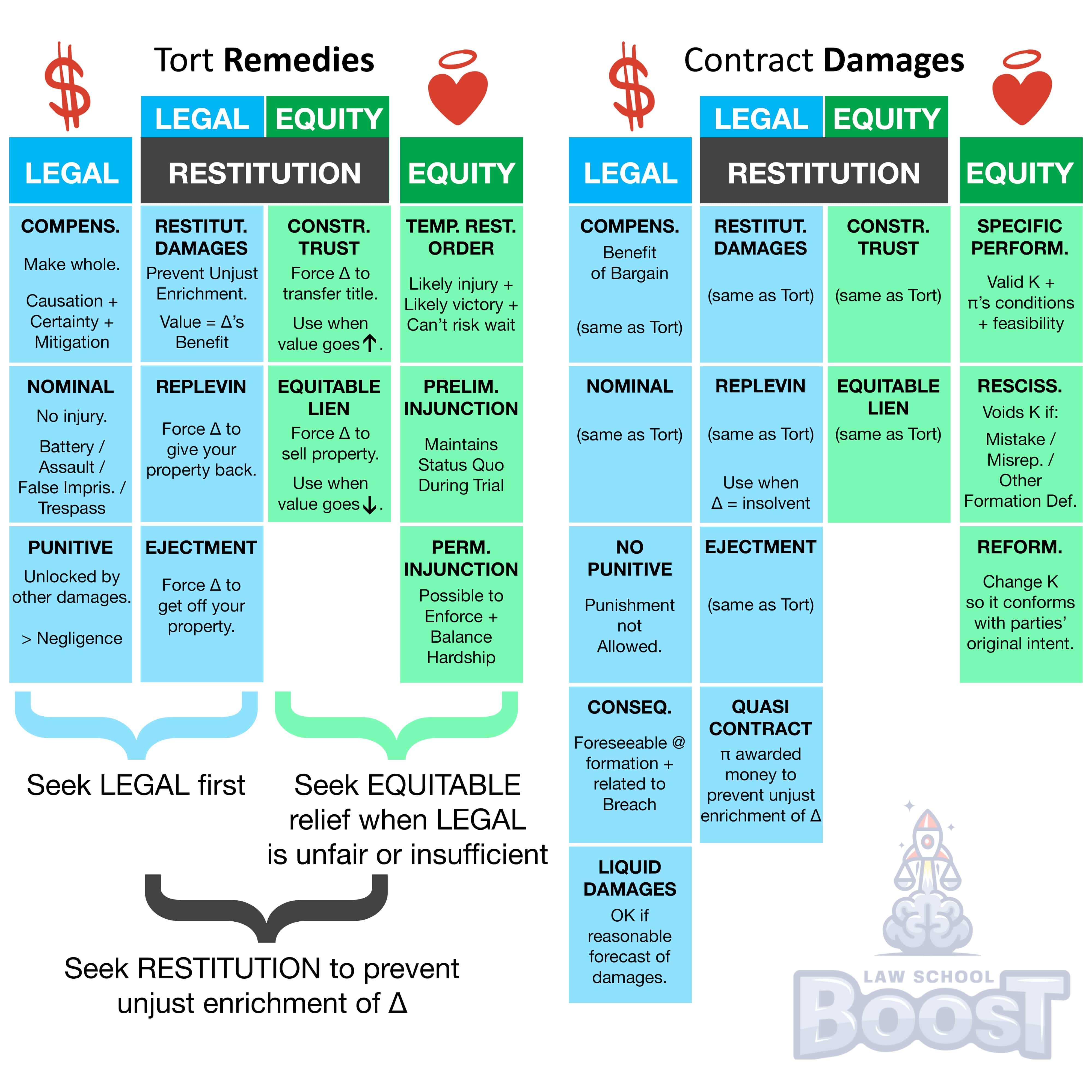🏥
Remedies • Tort - Equitable Remedies
REM#028
Legal Definition
Money damages may be inadequate because they were too speculative, the injury is truly irreparable, or the plaintiff seeks to avoid a multiplicity of actions (i.e., where there's a history of prior litigation between the parties).
Plain English Explanation
When a court is deciding whether to stop someone from doing something (a "permanent injunction"), sometimes just giving money to the person who was harmed isn't enough. This might be because:
- It's hard to guess how much money would make things right (too speculative).
- The harm done can't be fixed with money (truly irreparable).
- The person who was harmed doesn't want to keep coming back to court over and over again because of repeated issues with the same person (multiplicity of actions).
The rule exists to ensure that justice is served in the best possible way. If money can't fix the problem, the court might decide to stop the harmful action altogether.
- It's hard to guess how much money would make things right (too speculative).
- The harm done can't be fixed with money (truly irreparable).
- The person who was harmed doesn't want to keep coming back to court over and over again because of repeated issues with the same person (multiplicity of actions).
The rule exists to ensure that justice is served in the best possible way. If money can't fix the problem, the court might decide to stop the harmful action altogether.
Hypothetical
Hypo 1: Bob keeps playing loud music every night, disturbing Sam's sleep. Sam sues Bob multiple times for the disturbance, but Bob just pays the fine and continues with the loud music. Result: The court decides that money isn't solving the problem and orders Bob to stop playing loud music permanently. This is because of the "multiplicity of actions" since Sam had to sue Bob multiple times.
Hypo 2: Bob has a unique family heirloom that belongs to Sam. Instead of returning it, Bob offers to pay for it. But the heirloom has sentimental value and can't be replaced. Result: The court decides that the injury is "truly irreparable" and orders Bob to return the heirloom to Sam.
Hypo 3: Sam has a unique flower species in his garden. Bob, out of jealousy, threatens to release pests that could harm these flowers. The potential loss in value and the cost of extermination are hard to predict. Result: The court grants a permanent injunction preventing Bob from releasing the pests because the potential damages are too speculative.
Hypo 4: Bob borrows $50 from Sam and doesn't return it. Sam sues Bob for the money. Result: The court orders Bob to pay Sam the $50. In this case, the rule doesn't apply because the harm can easily be fixed with money.
Hypo 2: Bob has a unique family heirloom that belongs to Sam. Instead of returning it, Bob offers to pay for it. But the heirloom has sentimental value and can't be replaced. Result: The court decides that the injury is "truly irreparable" and orders Bob to return the heirloom to Sam.
Hypo 3: Sam has a unique flower species in his garden. Bob, out of jealousy, threatens to release pests that could harm these flowers. The potential loss in value and the cost of extermination are hard to predict. Result: The court grants a permanent injunction preventing Bob from releasing the pests because the potential damages are too speculative.
Hypo 4: Bob borrows $50 from Sam and doesn't return it. Sam sues Bob for the money. Result: The court orders Bob to pay Sam the $50. In this case, the rule doesn't apply because the harm can easily be fixed with money.
Visual Aids

Related Concepts
What are equitable remedies in tort?
What are the defenses to a suit seeking injunctive relief?
What is a preliminary injunction and how is it issued?
What is a temporary restraining order ("TRO") and what is required to get one?
What is contempt?
What is the collateral bar rule?
What parties are bound by an injunction?
When assessing a permanent injunction, how do courts balance hardships?
When assessing defenses to a lawsuit seeking injunctive relief, when are unclean hands applicable?
When assessing defenses to a lawsuit seeking injunctive relief, when is impossibility applicable?
When assessing defenses to a lawsuit seeking injunctive relief, when is laches applicable?
When deciding on a permanent injunction, when may ejectment be inadequate?
When may replevin be inadequate as a remedy and, instead, a court will opt for a permanent injunction?
When will a court issue a permanent injunction?


